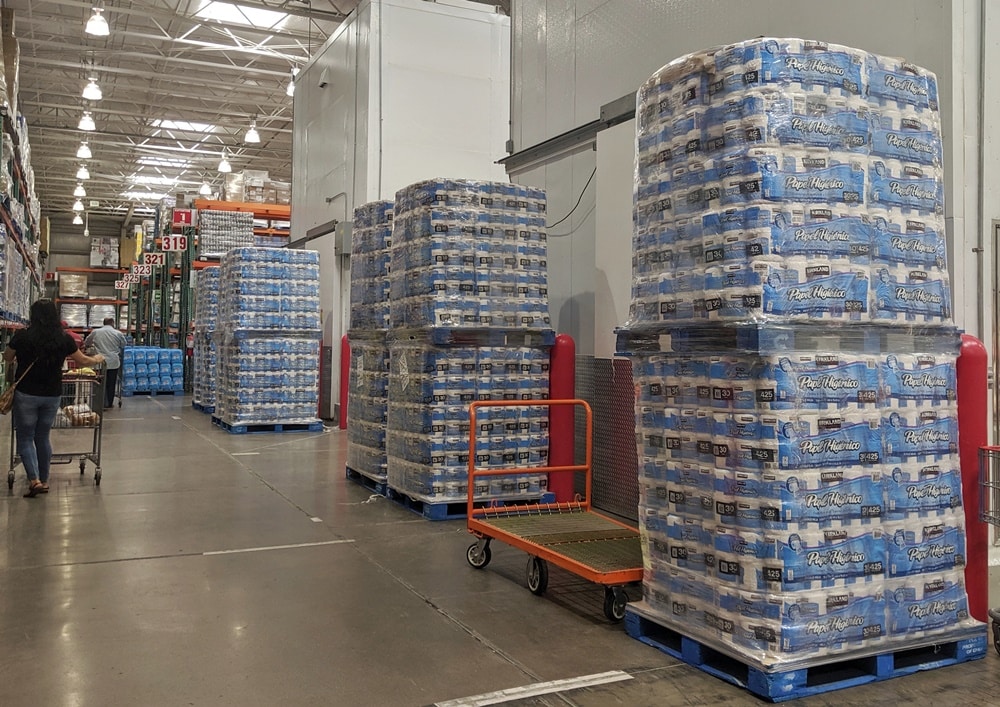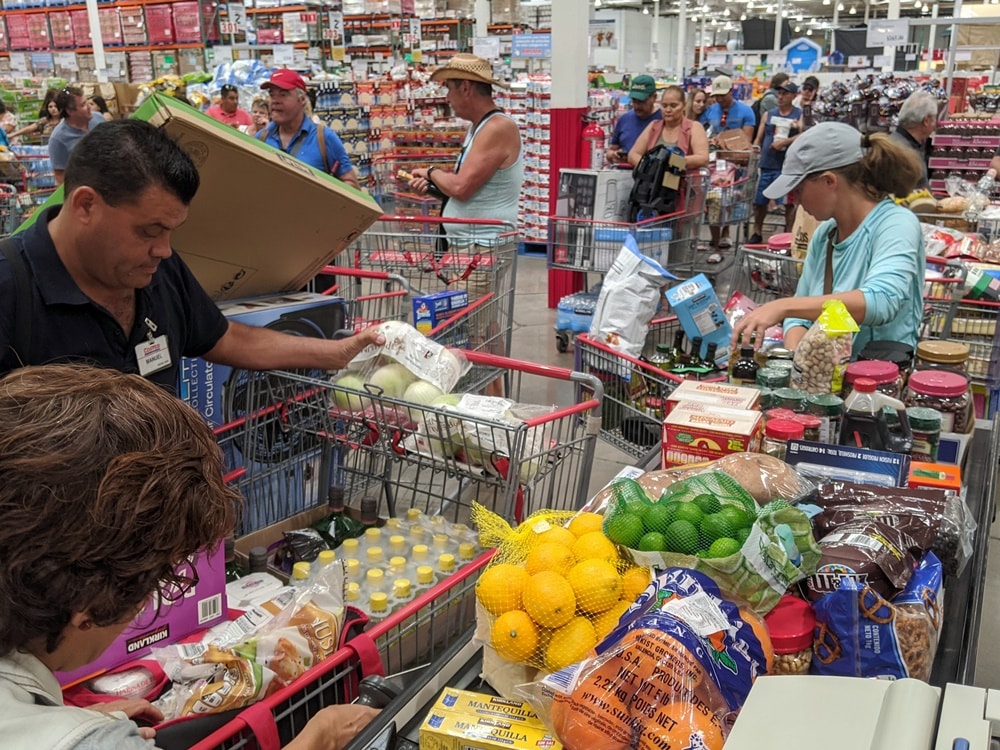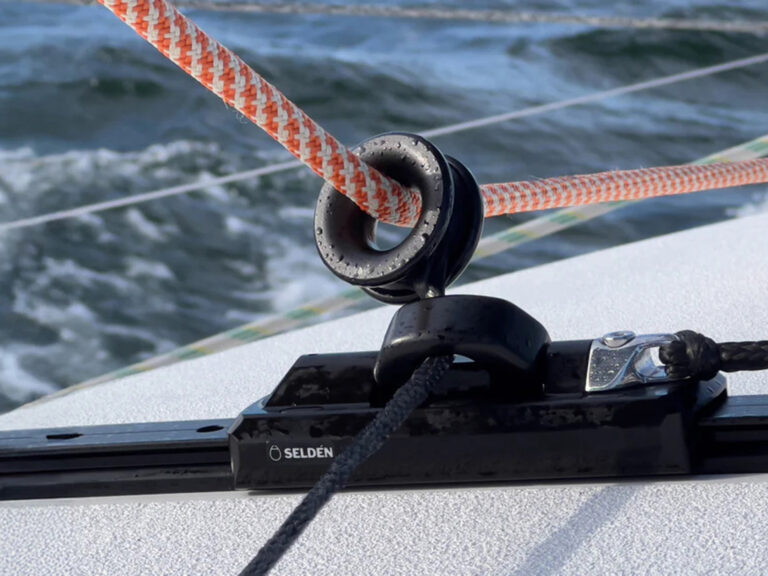
Plans are swirling: Only a few days since I speculated about impact to our routing for the South Pacific, stringent regulations are being implemented across island nations. Our plans remain uncertain, but are taking shape. We have time to wait and watch, then make an informed decision instead of a hasty one.
Whether we sail thousands of miles to the South Pacific or remain in Mexico to self-isolate in the Sea of Cortez, it’s time to deeply provision Totem. It turns out that provisioning for the passage is much the same as provisioning for the pandemic: We must be self-sufficient with what we have on board for an extended period of time. Our process is highly transferable, and can be used by land-based folks planning to sequester for a while.
I didn’t expect to do our provisioning for the South Pacific for another week. This changed the way I prepared, as it was a very last-minute effort; probably much the same as people on land who are suddenly faced with the prospect of stocking up on short notice. While the mood here is mellow, I expect that to change and wanted to get all my provisioning done before the panic-buying we’ve seen happen elsewhere starts locally.

Instead of working through a detailed spreadsheet that calculated out my anticipated needs for a range of staples, I followed my basic plan for passages:
- Make a meal list: breakfasts, lunches, dinners (add one for snacks, too)
- Create a shopping list based on ingredients for those meals
- Increase quantities to accommodate months instead of weeks of stock on hand
- Go shopping!
It is deceptively simple, yet very effective. It works whether you are heading to distant islands on your boat, or stocking up at home to minimize exposure and help flatten the curve of the virus’ impact. As long as you cook at least sometimes, it is pretty easy to do in a quick brainstorm vs needing an extended planning process.
One key twist for my quickie COVID-19 provisioning: I used pantry meals as the basis for planning. What’s a pantry meal? It’s what you can cook from shelf-stable or long-term stores, vs relying on fresh ingredients. Cook today, tomorrow or next month; all the same! Freshies are great, but have an obvious time limit; we’re anticipating self-sufficiency for months instead of weeks.
Below is precisely the list of meals (followed by shopping list) I used as the basis for my planning, with a few notes added to help. The shopping list is cumulative: for example, if I listed tortillas in our breakfast section’s shopping list, I didn’t add it again under the lunch list.
Breakfast
- Pancakes (maple syrup is one of the deep stash items we hoard! Delicious local honey with lemon juice squeezed in a nice alternative)
- Oatmeal with raisins (easy single-serving: pour ½ c boiling water over ¼ cup oats in a mug; cover to ‘cook’ for five minutes)
- Breakfast pudding: mix chia seeds, oats, and thinned yogurt or coconut milk; this sets in the fridge overnight. Add spices, dried fruit as desired, drizzle honey on top.
- Eggs and toast or skillet biscuits (1 c flour / 1 Tbsp baking powder / water to make a stiff batter)
- Frittata: if no fresh veg to add, try preserved options like sun dried tomatoes
- Granola and milk/yogurt
- Pan fried cornbread (half the reason I make cornbread for dinner is to fry it for breakfast!)
- Muffins: when feeling ambitious enough to bake
- Breakfast burritos: eggs, salsa, onions, cheese in a tortilla
- Chilaquiles: plain tortilla chips stir-fried with a can of enchilada sauce, topped with an egg
Shopping list:
- Flour
- Cornmeal
- Baking powder, soda
- Chocolate chips (for the pancakes OF COURSE)
- Yogurt for starter (we’ll make our own continuously from a starter)
- Rolled oats
- Chia seeds
- Dried fruit
- Walnuts, almonds
- Honey and sugar
- Granola
- UHT milk, powdered milk
- UHT media crema (half cream) or cream
- Tortillas
- Enchilada sauce
- Spice rack staples: cinnamon, cloves, cumin, chili powder
- Maple syrup (or, honey + lemon)
- Pantry staples: sun dried tomatoes, pickled onions, artichoke hearts, olives
- Long-life freshies: eggs, butter. We’ll by multiple flats of 30, we’ve kept eggs 6+ weeks unrefrigerated without issue; just flip over the container every few days.
Lunch
- Hearty chip & dip: One jar each of black beans, corn and salsa; season with some cumin and salt, eat with totopos (tortilla chips) or tostadas
- Tuna sandwiches: we actually make these vegetarian style with garbanzo beans instead! Extra good on fresh bread
- Sandwiches with salami and cheese (shelf-stable sausage, cheese always a top priority for us)
- Corn fritters (can of corn, flour, egg plus whatever random veg is left and seasoning – liquid if needed to make a drop-biscuit consistency), fried in a skillet
- Fresh focaccia bread (basic bread recipe; smear with tomato sauce or thinned tomato paste; bury olives or sundried tomatoes on top).
- No-lettuce salads: add a grain to any of these, like quinoa or couscous or wheat berries, to make it extra hearty.
- garbanzos/tomato/onion/herb in cumin-scented vinaigrette
- marinated beets (canned) /minced onion/feta with Dijon/garlic vinaigrette
- shredded carrots and cabbage (the last two veggies standing after multi-weeks away from stores) with Asian style peanut dressing (we always have peanut butter). Crumble in ramen noodles.
- The “Farmer’s plate” is a family favorite, spreading finger-food out for sharing: cured meat, cheese, dolmas (rice wrapped in grape leaves; canned), tear of hunks of fresh bread and dip in seasoned olive oil
- Soup (packaged, or make your own from veggies still in the fridge) & salad
Shopping list:
- Black beans (dried or canned)
- Corn (canned)
- Salsa (Herdez cans in Mexico are good)
- Refried beans (prepared, shelf stable)
- Bouillon
- Garbanzo beans (dried or canned)
- Pickles
- Salami / summer sausage
- Mayonnaise (favored on Totem: Mexican chipotle (smoked chili) mayo!)
- Peanut butter
- Soy sauce
- Sesame oil
- Tabasco / Valentina / Cholula / hot sauce of choice
- Quinoa
- Couscous
- Wheat berries
- Dried mint
- Roasted peanuts
- Ramen
- Tomato paste
- Pickled beets
- Dolma tins
- Olive oil
- Balsamic vinegar
- Dijon
- Crackers
- Long-life freshies: cheddar cheese (prioritized in fridge!), feta, cabbage, onions, oranges, limes.
Dinner
- Dal bhat – lentil stew and rice. A jar of chutney makes it more interesting!
- Simple curry: jars of prepared curry sauces like Patak’s go a long way; you can add chick peas to them, or canned chicken… thin them out with coconut milk or a can of diced tomatoes, depending on the type and your taste… serve with rice or couscous.
- Colcannon: one-pot potato / cabbage goodness. Good with gravy on top (instant mushroom gravy makes it easy); we keep instant mashed potatoes on hand for passages and meals like this, but potatoes are easy too and store for ages.
- Pasta (if passage making: pre-cook pasta, add some oil to prevent sticking and save in fridge in Ziploc – or save for calm days) with…
- Jar of pesto, bonus if you have parm for the top.
- Puttanesca sauce (all ingredients are pantry items: anchovies, olives, capers, etc.)
- Chick peas, garlic, olive oil, cracked pepper
- Can of artichoke hearts, plus parm, butter or olive oil, use a can of evap milk if you want a creamy sauce
- fresh garlic bread (warm, fragrant bread totally wins over a hangry family)
- spaghetti alla carbonara (eggs last ages; bags of shelf-stable bacon from Costco make this an anytime treat)
- One-pot pressure cooker pasta (throw ingredients in, bring up to pressure, done)
- Veggie burgers (our recipe is based on oats and walnuts – pantry friendly!)
- Moroccan style chick peas over couscous. Couscous is a dream in the tropics because, just add boiling water (less heat in galley).
- Enchiladas stuffed with rice, beans and cheese; add any veg left standing, even if it’s just grilled onions. Packaged tortillas keep for a scary long time, have I mentioned that?
- Canned chicken (get at Costco) isn’t bad, and is the ‘meat fix’ the Totem carnivores often need. Can add into so many things, from pasta dishes to enchiladas, or just serve over instant mashed potatoes.
Shopping list:
- Lentils (red or green)
- Instant gravy
- Instant mashed potatoes
- Pasta varieties
- Vacu-packed bacon
- Anchovy tins or anchovy paste
- Capers
- Parmesan cheese
- Canned chicken (I can my own, not hard and it’s much tastier)
- Canned tomatoes
- Coconut milk
- Curry sauce base
- Chutney
- Canned pork
- Rice
- Monterey jack cheese
- Long-life freshies: potatoes, garlic, ginger tomatoes (yes, really, see below)
How do you know much should you buy? After writing out the shopping list, go back and put a tick next to each item based on how many meals you expect to use it in. Take your family’s typical meal quantity, multiply by ticks, and BAM! You have your quantities.

Ours and yours
Of course, this is uniquely our family’s list, and reflects our limitations. For example, I don’t count on freezer space; we have one, but it’s tiny. I’ve been canning meat to make up for our inability to store fresh meat for my crew of carnivores, and have jars set aside with pork, chicken, and beef to add to everything from pasta sauce to enchiladas. But those aren’t even mentioned above, as they’re optional; these meals are overwhelmingly based on items on a shelf or in a locker that don’t require Super Prepper Skills like home canning! And yes, we may supplement with fishing – in fact, we really hope to (see: capers, butter, and citrus in the list), but I’m not counting on it.
I’ll top this off with a round of “normal” shopping, so we’ll have lots of fresh fruit and vegetables on hand that get us started. As cruisers, we’ve had the chance to build skills over time that help us handle this with relative ease, and lower stress – and hopefully, those skills can now help our friends more accustomed to convenience. And so in the spirit of the cruising community, we offer from what we have – and our hope that this time can be in our collective rearview mirror soon, and that we each help as we can along the way to that eventuality.

Further resources
My good friends Nica Waters and Carolyn Shearlock, bloggers and podcasters, have relevant resources to help.
- Eating Well with a Tiny Fridge: this book was written for RVers and boaters, but the tips are good for everyone! Carolyn’s offering this at a special, pay-what-you-want scale to help people self-isolate – or, free! Details at the link. Want to know how to have fresh tomatoes for a month? You need this book.
- Provisioning course: free! Nica has rejiggered her provisioning course to help land and boat based humans prepare. Her approach is VERY much like mine – in fact, this post is almost like a real-world illustration of the methodology! She’s currently offering it for free. See: Stocking up Sanely.
Hopefully this offer idea starters for your own planning: whether you’re preparing to self-isolate for a while, to quarantine at home, or sail across an ocean.








